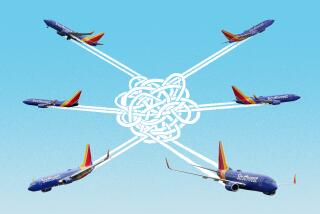Industry Bristles at New Airline Commission : Transportation: Some of the largest carriers voice regret at not being named to government’s blue-ribbon panel.
- Share via
The Clinton Administration’s first step toward turning around the nation’s troubled airlines--appointing a blue-ribbon commission--met with skepticism Friday from the industry it is intended to help.
As the White House and Congress named the panel’s 15 members--headed by former Gov. Gerald L. Baliles of Virginia--some of the largest carriers voiced their regret at being left out, while other industry officials expressed doubt that the commission will lead to any significant change.
“We would have welcomed an opportunity to participate in the airline commission,” said Clay McConnell, spokesman for Delta Air Lines, the nation’s third-largest carrier.
“After all, the largest carriers are those that might be primarily affected.”
Made up of former government officials, academics and aerospace executives, the commission includes only one passenger airline executive--Herbert D. Kelleher, chairman of Dallas-based Southwest Airlines.
While tiny compared to the industry’s Big Three--American, Delta and United--Southwest, with its low-cost, low-fare strategy, has turned profits while all the other major airlines were piling up losses.
Kelleher is widely respected, and the Big Three will be heard in commission testimony.
But “I don’t know whether the (largest) airlines--not having participated--will be of a mind to consider whatever recommendations they make,” aviation attorney Gerard R. Lear said.
Forming a commission falls short of the bold industrial policy measures Clinton has advocated to ensure the vitality of the nation’s key industries.
Still, policy analysts say a commission can be a small but important first step in the process.
“Part of trying to get a coherent policy is to get all the relevant players together and thrash it out,” said Clyde Prestowitz, a former U.S. trade negotiator who now heads the Economic Strategies Institute in Washington.
“The makeup of the group is much broader than just airlines,” added transportation consultant Daniel Kasper, a commission member. “The idea is to take a fresh and open-minded view of the situation and try to assess what the problems are and the best ways to move ahead and improve the situation.”
The National Commission to Ensure a Strong Competitive Airline Industry--which has 90 days to come up with recommendations--faces a task as daunting as its name. Even among airline officials, there is widespread disagreement over what ails the industry--let alone solutions to such concerns as bankrupt carriers and overcapacity.
During the last 2 1/2 years, domestic airlines have posted combined losses of about $10 billion, laid off thousands of workers and canceled or postponed orders for several hundred new aircraft.
“It may be difficult for a natural consensus to form on any of the more-divisive issues,” said Samuel C. Buttrick, an airline industry analyst at Kidder, Peabody & Co. “In any event, any recommendation of the commission that would truly aid the airlines would either be anti-labor, anti-consumer or would cost the government money. As such, they may be very difficult to enact politically.”
The head of the nation’ largest airline--American Airlines’ Robert Crandall--has questioned the need for the commission in the first place. Crandall, like many others in the industry, fears that the commission could open the door to re-regulation of the industry.
Speaking Friday before a travel group in Dallas, Crandall said he was impressed with the commission’s membership, but that he too would have liked to see representation from the nation’s largest carriers.
More to Read
Inside the business of entertainment
The Wide Shot brings you news, analysis and insights on everything from streaming wars to production — and what it all means for the future.
You may occasionally receive promotional content from the Los Angeles Times.










